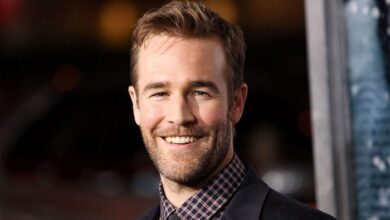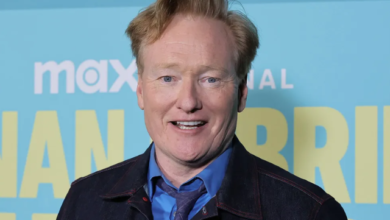Angelina Jolie enters her mahogany-paneled dining room in Los Feliz in a gauzy white sundress and slides, carrying a pot of herbal tea, three large dogs trailing behind her. It’s mid-August, and Jolie is about to do something she hasn’t done in years—travel to a bunch of film festivals to promote her movies. Maria, the Pablo Larraín biopic in which she plays opera’s defining diva, Maria Callas, is set to premiere in Venice, Telluride and New York; Without Blood, the war drama she wrote and directed from Alessandro Baricco’s 2002 novel, will be at the Toronto Film Festival, where she’ll be honored with a tribute award Sept. 8. Netflix will release Maria in the U.S., Without Blood is seeking a distributor, and both films mark a return to the prestige movie business for Jolie, 49, after years of focusing primarily on being a mother to her six children, who now range in age from 16 to 23. Her last film as a director was 2017’s First They Killed My Father and most recent as an actor was the 2021 Marvel movie Eternals.
The film projects are personal in ways that are almost uncomfortable to discuss, with Maria — for which Jolie spent more than six months learning to sing, breathe and walk like the mercurial soprano — a portrait of an icon imprisoned by her own image. The movie is set in Paris in 1977, in the final days of Callas’ life, when she is trying to sing again after years away from a stage, for a public that had booed her when they didn’t like the sound of her voice and branded her a “tigress” for her temperament. Larraín says that, like Callas, “Angelina has an enormous amount of mystery. I thought she could play this woman who is looking to find her own identity.”

Without Blood, which stars Salma Hayek Pinault and Demián Bichir as two people linked by a traumatic event in their youth, is a return to a subject Jolie repeatedly mines as a filmmaker: the impact of conflict (in this case, one that is never specified). It’s a subject of intense interest to her as a mother and an advocate who has traveled to refugee camps and war zones.
Jolie’s home is a lushly landscaped beaux arts mansion built for Cecil B. DeMille that she bought after her 2016 separation from Brad Pitt in a highly contentious, headline-fueling divorce that is still ongoing. A towering tree house in the yard is a sign of the family she has raised within its wrought-iron gates. She built the tree house too high, she says, because “I’ve never been afraid of heights.”
Having now made two films so intimate to her own experiences, Jolie is figuring out how she wants to talk about them. She declines to discuss Pitt, or talk about 20-year-old son Pax’s recent e-bike accident, other than to say he is recovering. Over the course of the long afternoon, while her dogs snore softly at her feet, the actress will open up with bracing candor around some subjects — like the quite literal rediscovery of her own voice — and draw firm boundaries around others. In the old Hollywood, Jolie says, “You could have this messy private process and the work spoke. Now, the audience’s relationship is different. I’m trying to get used to what to share.”
I am often not. I was an artist early to just help my mom pay bills. I’ve had times where I’ve loved being an artist, and I’ve had times where I felt very, very far away from being comfortable in the business. I’m hoping to be able to have a new relationship with it.







